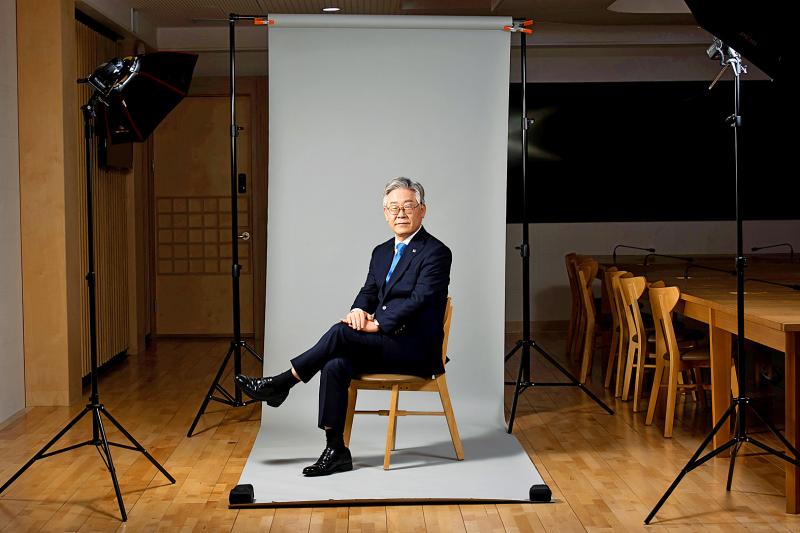Record government spending triggered by COVID-19 in South Korea has helped send a maverick regional governor to the top of polls to be the next president and fueled his push to make the country Asia’s first to introduce universal basic income.
Gyeonggi Governor Lee Jae-myung, who has served as governor of South Korea’s most populous province since 2018, warns that without across-the-board income support to address inequality, the stability of the country’s economy could be threatened.
“The capitalist system could fall apart if consumption and demand aren’t supported,” Lee, 56, said in an interview last week.

Photo: Bloomberg
His move early in the pandemic to provide handouts to boost the regional economy surrounding Seoul helped prod the central government to take action at the national level.
Lee’s call for the introduction of a universal basic income might also be followed by other politicians with an eye on the presidency, potentially extending the era of expansionary fiscal policy long after the virus is gone.
Lee, who grew up in poverty, said he firmly believes growing income disparity would make markets unsustainable, and universal basic income would “fix and further develop” capitalism.
“Massive fiscal spending in Korea is certainly helping his popularity,” said Rory Green, an economist with research firm TS Lombard. “The weaker the rebound, the more untenable a fiscally conservative political stance becomes.”
The race is tight. A KStat Research survey last week showed 26 percent of respondents preferred Lee as the next president, just three years after he ran unsuccessfully against now South Korean President Moon Jae-in in the Democratic Party primaries.
The poll showed Lee came in 5 percentage points better than party leader Lee Nak-yon, who once served as Moon’s prime minister.
Moon’s single, five-year term ends in 2022.
However, in another survey by Korea Research International released on Saturday, the former prime minister took the lead with 26 percent of favorability rating, about 3 percentage points higher than the governor.
“I have confidence in my understanding of how society and the global economy work, and how their problems can be fixed.” Lee Jae-myung said. “I’m not going to compromise.”
While Moon initially made efforts to raise the minimum wage, the country’s income inequality still remains among the developed world’s highest, according to Organisation for Economic Co-operation and Development data.
Lee Jae-myung said far more needs to be done.
South Korea should start with an annual basic income of about 500,000 won (US$430) and gradually move toward a monthly handout that is as big over the course of 10 to 15 years, he said.
A Realmeter poll in June showed that 49 percent of South Koreans approved of the idea of universal basic income while 43 percent opposed it.
Still, the call for a universal income is not limited to the governor or other progressives in Moon’s camp. The idea is also gaining support in the top opposition conservative group.
The newly named People Power Party recently introduced a pledge to seek a basic income.
Its interim party leader, Kim Chong-in, is trying to build support by embracing some of the popular economic policies of the left with a tough stand on security that has been a key position of the right.

Former Nicaraguan president Violeta Chamorro, who brought peace to Nicaragua after years of war and was the first woman elected president in the Americas, died on Saturday at the age of 95, her family said. Chamorro, who ruled the poor Central American country from 1990 to 1997, “died in peace, surrounded by the affection and love of her children,” said a statement issued by her four children. As president, Chamorro ended a civil war that had raged for much of the 1980s as US-backed rebels known as the “Contras” fought the leftist Sandinista government. That conflict made Nicaragua one of

COMPETITION: The US and Russia make up about 90 percent of the world stockpile and are adding new versions, while China’s nuclear force is steadily rising, SIPRI said Most of the world’s nuclear-armed states continued to modernize their arsenals last year, setting the stage for a new nuclear arms race, the Stockholm International Peace Research Institute (SIPRI) said yesterday. Nuclear powers including the US and Russia — which account for about 90 percent of the world’s stockpile — had spent time last year “upgrading existing weapons and adding newer versions,” researchers said. Since the end of the Cold War, old warheads have generally been dismantled quicker than new ones have been deployed, resulting in a decrease in the overall number of warheads. However, SIPRI said that the trend was likely

NUCLEAR WARNING: Elites are carelessly fomenting fear and tensions between nuclear powers, perhaps because they have access to shelters, Tulsi Gabbard said After a trip to Hiroshima, US Director of National Intelligence Tulsi Gabbard on Tuesday warned that “warmongers” were pushing the world to the brink of nuclear war. Gabbard did not specify her concerns. Gabbard posted on social media a video of grisly footage from the world’s first nuclear attack and of her staring reflectively at the Hiroshima Peace Memorial. On Aug. 6, 1945, the US obliterated Hiroshima, killing 140,000 people in the explosion and by the end of the year from the uranium bomb’s effects. Three days later, a US plane dropped a plutonium bomb on Nagasaki, leaving abut 74,000 people dead by the

Indian Prime Minister Narendra Modi is to visit Canada next week, his first since relations plummeted after the assassination of a Canadian Sikh separatist in Vancouver, triggering diplomatic expulsions and hitting trade. Analysts hope it is a step toward repairing ties that soured in 2023, after then-Canadian prime minister Justin Trudeau pointed the finger at New Delhi’s involvement in murdering Hardeep Singh Nijjar, claims India furiously denied. An invitation extended by new Canadian Prime Minister Mark Carney to Modi to attend the G7 leaders summit in Canada offers a chance to “reset” relations, former Indian diplomat Harsh Vardhan Shringla said. “This is a